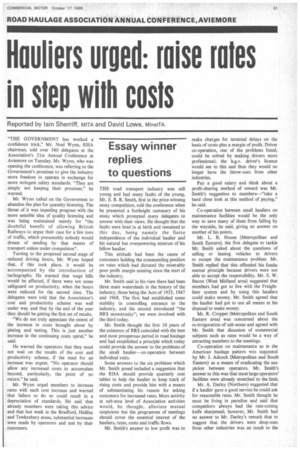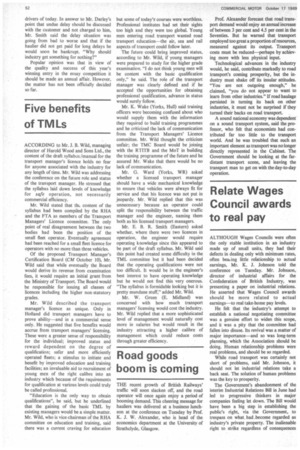Hauliers urged: raise roles
Page 53

Page 54

If you've noticed an error in this article please click here to report it so we can fix it.
in step with costs• Reported by lain Sherriff. MITA and David Lowe, MInstTA.
Essay winner replies to questions
"THE GOVERNMENT has worked a confidence trick," Mr. Noel Wynn, RHA chairman, told over 340 delegates at the Association's 21st Annual Conference at Aviemore on Tuesday. Mr. Wynn, who was opening the conference, was referring to the Government's promises to give the industry more freedom to operate in exchange for more stringent safety standards. "They are simply not keeping their promises," he warned.
Mr. Wynn called on the Government to abandon the plan for quantity licensing. The threat of it was impeding progress with the more sensible idea of quality licensing and was being maintained merely for "the doubtful benefit of allowing British Railways to argue their case for a few tons of traffic, which presumably nobody would dream of sending by that means of transport unless under compulsion".
Turning to the proposed second stage of reduced driving hours, Mr. Wynn hoped that, if this took place, it would be accompanied by the introduction of tachographs. He warned that wage bills would be affected, if there were not some safeguard on productivity, when the hours were reduced for the second time. The delegates were told that the Association's cost and productivity scheme was well under way and that by the end of the year they should be getting the first set of results.
"We do not truly appeciate the extent of the increase in costs brought about by plating and testing. This is just another increase in the continuing costs spiral," he said.
He warned the operators that they must not wait on the results of the cost and productivity scheme, if the need for an increase was urgent. "No operator should allow any increased costs to accumulate beyond, particularly, the point of no return," he said.
Mr. Wynn urged members to increase rates with each cost increase and warned that failure to do so could result in a depreciation of standards. He said that already members were taking this advice and that last week in the Bradford, Halifax and Tewkesbury areas, substantial increases were made by operators and met by their customers. THE road transport industry was still young and had many faults of the young, Mr. E. B. R. Smith, first in the prize-winning essay competition, told the conference when he presented a forthright summary of his essay which prompted many delegates to answer with their views. He thought that the faults were bred in at birth and remained to this day, being namely the fierce independence of the individual haulier and his natural but overpowering mistrust of his fellow haulier.
This attitude had been the cause of customers holding the commanding position on rates which had dictated the miserably poor profit margin existing since the start of the industry.
Mr. Smith said in his view there had been three main watersheds in the history of the industry, these being the Acts of 1933, 1947 and 1968. The first had established some stability in controlling entrance to the industry, and the second introduced "the BRS monstrosity"; we were involved with the third today.
Mr. Smith thought the first 10 years of the existence of BRS coincided with the best and most prosperous period in road haulage and had established a principle which today could provide the answer to the problems of the small haulier—co operation between individual units.
Some answers to the six problems which Mr. Smith posed included a suggestion that the RHA should provide quarterly cost tables to help the haulier to keep track of rising costs and provide him with a means of substantiating his reason for asking customers for increased rates. More activity at sub-area level of Association activities would, he thought, alleviate mutual suspicions but the programme of meetings should cover the essential interest of the hauliers, rates, costs and traffic flows.
Mr. Smith's answer to low profit was to make charges for terminal delays on the basis of costs plus a margin of profit. Driver co-operation, one of the problems listed, could be solved by making drivers more professional; the h.g.v. driver's licence would see to this and then they would no longer have the throw-outs from other industries.
Pay a good salary and think about a profit-sharing method of reward was Mr. Smith's suggestion to member s—"take a hard close look at this method of paying," he said.
Co-operation between small hauliers on maintenance facilities would be the only way to save many of them from falling by the wayside, he said, giving an answer on another of his points.
Mr. L. •R. House (Metropolitan and South Eastern), the first delegate to tackle Mr. Smith asked about the questions of selling or leasing vehicles to drivers to escape the maintenance problem. Mr. Smith replied that this offended his fundamental principle because drivers were not able to accept the responsibility. Mr. S. W. Bacon (West Midland area) suggested that members had got to live with the Freightliner system and by using this hauliers could make money. Mr. Smith agreed that the haulier had got to use all means at his disposal to make money.
Mr. R. Cropper (Metropolitan and South Eastern area) was concerned about the re-invigoration of sub-areas and agreed with Mr. Smith that disussion of commercial subjects such as rates would be a way of attracting members to the meetings.
Co-operation on maintenance as in the American haulage pattern was suggested by Mr. J. Adcock (Metropolitan and South Eastern) as a means of eradicating the suspicion between operators. Mr. Smith's answer to this was that most large operators' facilities were already stretched to the limit.
Mr. A. Dailey (Northern) suggested that if a haulier gave a good service he could ask for reasonable rates. Mr. Smith thought he must be living in paradise and said that competitors always had the rate-cutting knife sharpened; however, Mr. Smith had no answer to Mr. Darley's remark that to suggest that the drivers were drop-outs from other industries was an insult to the drivers of today. In answer to Mr. Darley's point that undue delay should be discussed with the customer and not charged to him, Mr. Smith said the delay situation was going from bad to worse and that if the haulier did not get paid for long delays he would soon be bankrupt. "Why should industry get something for nothing?"
Popular opinion was that in view of the quality and success of this year's winning entry in the essay competition it should be made an annual affair. However, the matter has not been officially decided so far.




























































































































